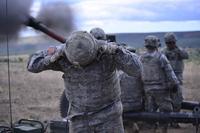Rachelle Arroyave was not worried when her Marine Corps husband left for his second deployment in Iraq. She never assumed the worst would happen. She never asked about what benefits she would receive if he was killed in action. In fact, she didn’t worry since the family lived in California and, she assumed, she would receive compensation under the state’s community property laws.
The worst did happen. Staff Sgt. Jimmy Arroyave was killed April 15, 2004, in a non-combat related vehicle accident.
And, soon after word came of Jimmy’s passing, Rachelle learned she had assumed wrong, about everything. Her husband had made another family member the beneficiary of his SGLI. Since the SGLI is a federal program, California said laws that would normally protect Rachelle were void.
Rachelle, pregnant with the couple’s third child, and their two young daughters were left without a cent.
“I assumed he had taken care of everything and did it in the best interest of his wife and children,” Rachelle says. “Did Jimmy put us in this situation [financial hardship] on purpose? No, but ultimately, how he left things without informing me caused us to be in this situation. None of the SGLI has been set aside for our children and their future.”
Other wartime widows say they have found themselves in family disputes when their service member left blank the paperwork indicating where they wished to be buried.
“I think that everybody, whether you are being deployed or not, and their spouses should make sure that their affairs are in order. Nobody wants to think about the worst, but death is, unfortunately, a reality, especially during wartime,” Rachelle says.
“Having to deal with the loss of your spouse, taking care of your family and all the paperwork is already hard enough,” she says. “In addition, some surviving spouses have had to deal with their spouse’s paperwork being lost, not knowing their spouse’s last wishes, finding out that other family members were left crucial benefits.”
Gold Star Wives such as Rachelle are busy lobbying Congress to make changes that protect spouses after a service member’s death. After her husband’s death, Rachelle helped persuade lawmakers to pass a bill requiring military spouses to be notified if the beneficiary of their husband’s SGLI is changed. Such a notification may not have changed the outcome for Rachelle and her children, but she says, she would have at least been more prepared.
“Education is the key. If given the chance, I would have done so many things differently,” Rachelle says. “I would have asked the right questions, made sure our affairs were in order, because it would have prevented a lot of emotional and financial hardships for my family.”
A predeployment checklist
Rachelle and other Gold Star Wives say they have found that there seems to be no consistency in the military regarding predeployment checklists. While some units take this task very seriously, others rely on service members to get their own affairs in order.
Prior to deployment, the unit should have a deployment briefing. Be sure to attend this with your spouse.
The Gold Star Wives’ two top recommendations are first, have several copies of all important paperwork and documents. Some surviving spouses had to deal with the military losing SGLI paperwork and other documents, which caused numerable headaches and undue stress.
Second, do not sign or fill out paperwork unless you completely understand it. Some surviving spouses have filled out paperwork that gave control of their spouse’s body to someone else. They did not understand the terms of the papers. If you don’t understand, ask.
This list is a compilation of several deployment checklists we found on the Web. Hopefully, it will help make your predeployment planning a little easier.
Automobile
* If vehicle financed, know the name and address of the loan company.
* Where is title?
* Locate the vehicle’s registration.
* Know renewal date for license plate and how to renew.
* Know how to renew inspection sticker.
* Make sure you have insurance; some companies will let you take your deployed spouse off the insurance while they are deployed, to reduce the bill.
* Is vehicle in good operating condition; know where to go for repairs.
* Make a duplicate of all keys.
* Know how to make emergency repairs — replacing a dead battery or changing a tire.
Bills
* Organize and create a payment plan — know all payments that need to be made and on what date.
* Make sure you will have money available to you during your spouse’s absence.
* Get address of your bank.
* Get your account numbers and types of accounts.
* Know the location of your bank books.
* Do you have a safety deposit box? Where is the key?
* Know the location of all your credit cards; keep their numbers and the company’s contact information in a separate, safe location.
* Obtain power of attorney for accounts that are only in your service member’s name; tell creditors about the deployment — they may reduce interest rates.
Burial
If your unit does not give you paperwork regarding this issue, have your service member put, in writing, his wishes — whether they want to be buried or cremated and where they want to be buried.
Income Tax
* Decide how to pay taxes if he will be deployed during tax time. The IRS requires a power of attorney, obtained only from them, which allows you to file your spouse’s taxes; visit www.irs.gov.
* Keep copies of all your state and federal tax returns.
Insurance
* Know where your insurance documents are.
* Go over home insurance papers, decide if coverage is sufficient. Some homeowners insurance offers an additional option, that costs more, but that will pay off the mortgage if one spouse dies.
Deeds
* If you are not on the deed to your home, you may want to go through the trouble of having yourself added. Even if the service member has a will, if the spouse is not on the deed, you may have to go through probate if and when you try to sell the home, even years later.
DEERS
* Verify DEERS enrollment to make sure everyone can receive medical care.
ID Cards
* Check expiration on family member cards; obtain paperwork to renew cards while spouse is deployed.
Medical
* Know where your medical and dental records are kept; always keep copies of your records at your home as well as with the doctor.
* Know how to access medical care, especially important for new spouses new to the Tricare system or for Reserve and National Guard spouses who may not be close to medical facilities on post.
Official Records
* Keep a copy of every family members birth certificate.
* Keep a copy of your marriage certificate.
* Keep a copy of all adoption papers.
* Know the location of the above papers.
* Know the location of your social security card.
Power of Attorney
* Obtain a General Durable Power of Attorney, which authorizes a spouse to act on behalf of the other in financial affairs, can be revoked at any time and usually takes effect immediately. Know where this document is kept; you will probably need to fax it to financial institutions.
* You can also get a Health Care Power of Attorney, used when a spouse becomes incapacitated and is unable to make medical decisions on his own.
* A Limited Power of Attorney grants a limited amount of authority, i.e. it may allow spouse to make withdrawals from a bank account to pay bills, but nothing else.
Wills
* A General Will and Testament allows the service member to divvy up his assets. While some service members will not make a will because they feel the laws of the state they live in will provide for their spouse, this is not always true. Verify with JAG that the will is valid.
* Obtain a Living Will, the individual states their wishes regarding future health care in case they become incapacitated. This includes how to handle such issues as having a feeding tube inserted or removed or at what points machinery should or shouldn’t be used to keep them alive.
SGLI
* Discuss with your spouse how much SGLI (available in increments of $10,000 up to a maximum of $400,000) is suitable for your family if you were to loose his income due to death. Discuss beneficiaries.
* Make an appointment to see a trusted financial adviser who will advise you if the SGLI is sufficient for your family. Many military members purchase life insurance above the SGLI amount from other companies.
* Note, if a child is left as a beneficiary for the SGLI, the child will not receive the money until they turn 18. The surviving spouse will have to go to court to petition for the funds to be released earlier.





















